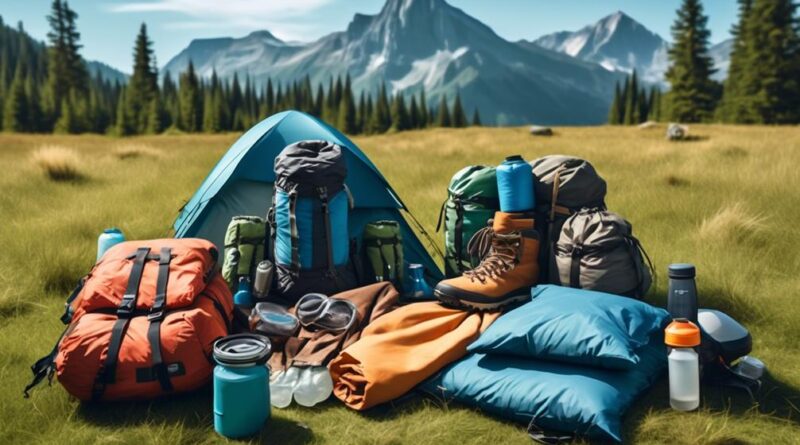Ultimate Camping Checklist for First-Time Campers
So, you've decided to venture into the great outdoors for the first time and experience the wonders of camping. As you prepare for this new adventure, it's essential to ensure you have all the necessary items to make your trip safe and enjoyable.
From shelter and sleeping gear to cooking equipment and personal items, there's a lot to consider when packing for your first camping trip. But fear not, this ultimate camping checklist has got you covered.
You'll want to make sure you have everything you need to make your outdoor experience as smooth as possible, and we're here to help you with just that.
Shelter
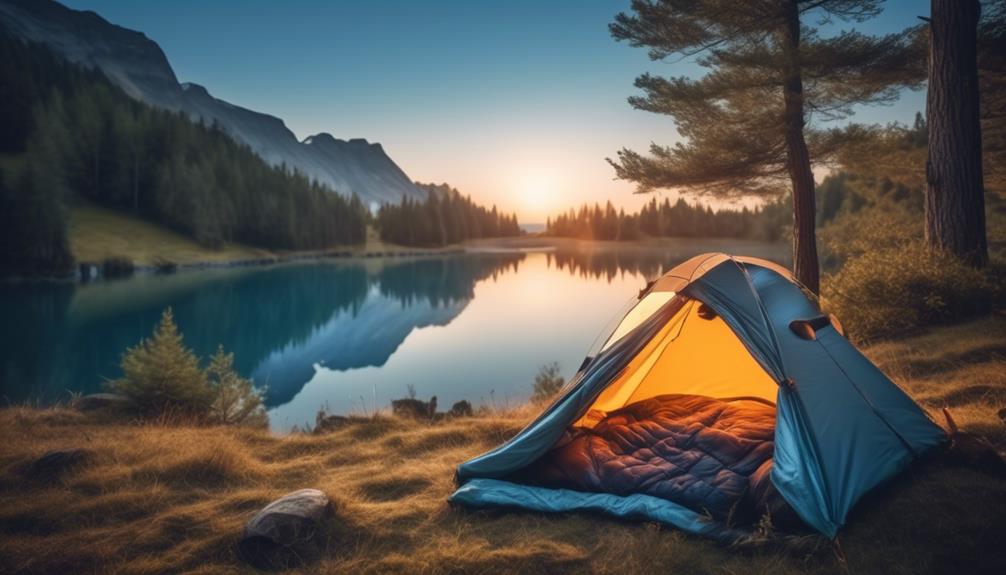
If you're camping for the first time, make sure to bring a sturdy and waterproof tent for shelter. A good tent is essential for a comfortable and safe camping experience. Look for a tent that's easy to set up and provides enough space for everyone in your group. Consider the weather conditions of your camping location and choose a tent that can withstand potential rain and wind. A rainfly is also important to keep you dry during rainy weather. Make sure to practice setting up your tent at home before your camping trip to avoid any last-minute struggles.
Additionally, bring a tarp or groundsheet to place under your tent for extra protection against moisture from the ground. This will help prevent water from seeping into your tent and keep the floor dry. It's also a good idea to bring along a sturdy mallet for hammering in tent stakes and a repair kit in case of any unexpected tears or damages to your tent.
When selecting a campsite, choose a flat and elevated area to set up your tent. Avoid low-lying areas where water can accumulate during rain. Clear the area from any rocks, branches, or debris that could potentially damage your tent floor.
Remember to pack a comfortable sleeping bag and sleeping pad for a good night's sleep. These items will provide insulation from the ground and keep you warm during chilly nights. With a reliable and comfortable shelter, you'll be well-prepared for a successful first camping trip.
Sleeping Gear
Ensure you pack a warm and comfortable sleeping bag and a reliable sleeping pad to insulate you from the ground and provide a good night's sleep during your camping trip. A sleeping bag rated for the expected temperatures is crucial. Look for a bag that suits the climate of your camping destination, whether it's a warm summer night or a chilly autumn evening. For milder conditions, a 3-season sleeping bag should suffice, but in colder weather, a 4-season or winter sleeping bag is necessary to keep you warm and cozy. Consider the insulation type as well: down-filled bags offer excellent warmth-to-weight ratio, while synthetic-filled bags are more resistant to moisture.
In addition to a sleeping bag, a sleeping pad is essential for insulation and cushioning. It provides a barrier between you and the ground, preventing heat loss and ensuring a more comfortable rest. There are various types of sleeping pads available, including self-inflating, air, and closed-cell foam pads. Self-inflating pads offer a good balance of comfort and insulation, while air pads are lightweight and packable. Closed-cell foam pads are durable and provide excellent insulation, but can be bulkier. Choose the type that best suits your needs and the camping conditions you anticipate.
Cooking Equipment
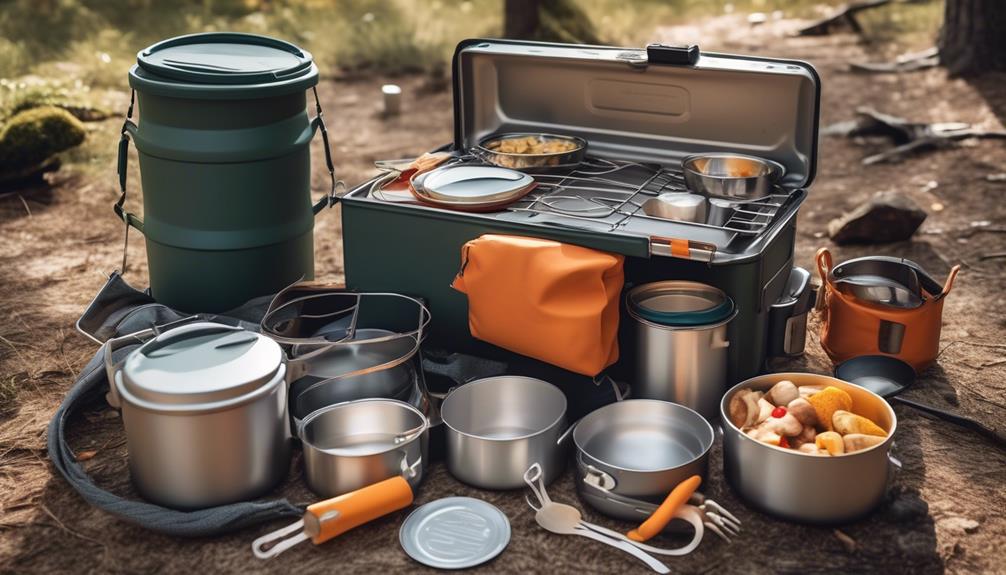
Pack a compact and efficient camping stove to prepare meals during your outdoor adventure. Look for a lightweight stove that's easy to set up and operate. A portable propane or butane stove is a great option as they provide a consistent heat source for cooking. Don't forget to bring extra fuel canisters to ensure you have enough for the duration of your trip.
In addition to a camping stove, bring along a set of durable cookware. A basic kit should include a pot for boiling water, a frying pan for cooking, and a small kettle for heating water for hot drinks. Opt for nesting cookware sets to save space in your backpack. Consider the size of your camping group when selecting your cookware to ensure you have enough capacity to prepare meals for everyone.
Remember to pack essential cooking utensils such as a spatula, cooking spoon, and a sharp knife. These tools will make meal preparation much easier and more enjoyable. A portable coffee maker or French press is also a great addition if you're a coffee enthusiast.
Lastly, include a cooler or insulated bag to keep perishable food items fresh. This will allow you to bring along items like meat, cheese, and produce without worrying about them spoiling. With these cooking essentials, you'll be well-prepared to whip up delicious meals and enjoy a satisfying camping experience.
Clothing and Footwear
When preparing for your camping trip, consider the weather and terrain to select appropriate clothing and footwear for comfort and safety. Start with a moisture-wicking base layer to keep you dry and comfortable. Pack synthetic or wool shirts and pants, as they dry quickly and provide insulation even when wet. Bring a waterproof and breathable jacket in case of rain. For colder weather, thermal underwear and a down or synthetic insulated jacket are essential. Don't forget to pack extra socks to keep your feet dry and blister-free.
Footwear is crucial for a successful camping trip. Choose sturdy, waterproof hiking boots for rocky or wet terrain. Make sure they're broken in to prevent blisters. For casual camp activities, lightweight and breathable trail shoes are a good option. Additionally, pack a pair of camp sandals to give your feet a break and let them air out after a long day of hiking.
Remember to bring a wide-brimmed hat or a cap to protect your face from the sun. Sunglasses with UV protection are also important to shield your eyes. Pack gloves for chilly nights and for handling firewood. Lastly, bring a swimsuit if there are opportunities for swimming or water activities at your campsite.
Personal Items
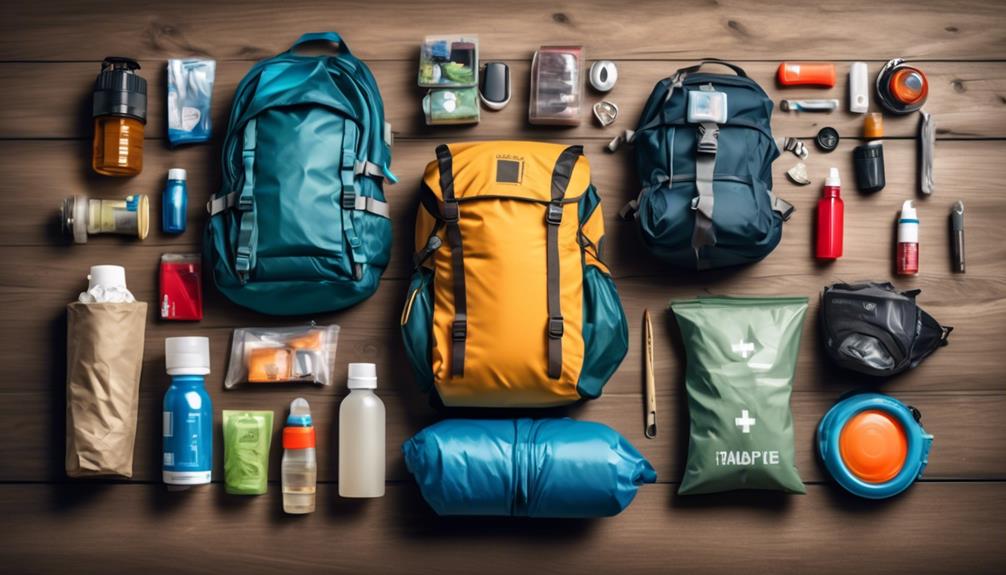
Don't forget to include personal items such as toiletries, medications, and any necessary personal hygiene products in your camping checklist. When it comes to toiletries, pack travel-sized shampoo, conditioner, and body wash to keep clean during your camping trip. Remember to bring a toothbrush, toothpaste, and dental floss for maintaining oral hygiene. Additionally, don't forget deodorant and a travel-sized brush or comb for personal grooming.
Medications are crucial personal items to remember. Ensure you bring an ample supply of any prescription medications you need, as well as over-the-counter medications for common issues such as headaches, allergies, or stomach troubles. It's also wise to pack a basic first-aid kit with bandages, antiseptic wipes, and pain relievers for minor injuries or discomfort.
Personal hygiene products are essential for feeling fresh and comfortable during your camping adventure. Pack menstrual hygiene products if needed, and consider bringing wet wipes, hand sanitizer, and toilet paper for cleanliness and sanitation. Sunscreen and insect repellent are also crucial personal items to protect your skin from the sun and pesky bugs.
Remember to pack any other personal items you use on a daily basis, such as contact lenses and solution, glasses, or any other specialized personal care products you may require. By ensuring you have all of these personal items in your camping checklist, you'll be well-prepared for a comfortable and enjoyable outdoor experience.
Campsite Essentials
A reliable tent and durable sleeping bag are essential for a comfortable and secure camping experience. These two items will be the cornerstone of your campsite, providing you with shelter and a good night's rest.
As you set up your tent, imagine the sense of accomplishment and excitement as you secure the stakes and see your temporary home take shape. Picture yourself cozily nestled in your sleeping bag, protected from the elements, and ready to recharge for the adventures that lie ahead.
Campsite Essentials:
- Shelter:
Setting up your tent can be a gratifying experience, knowing that you've created your own little haven in the wilderness. It's where you'll seek refuge after a day of exploration, where you'll bond with your camping companions, and where you'll listen to the soothing sounds of nature as you drift off to sleep.
- Sleeping Gear:
Your sleeping bag isn't just a mere piece of equipment; it's your cozy retreat in the midst of the great outdoors. Imagine the comfort and security it will provide as you settle in for the night, surrounded by the sounds of the night and the fresh, crisp air. Picture waking up refreshed and energized, ready to embrace the adventures of a new day.
Ensuring you have these campsite essentials won't only provide you with comfort and security but also set the stage for an unforgettable camping experience.
Safety and First Aid
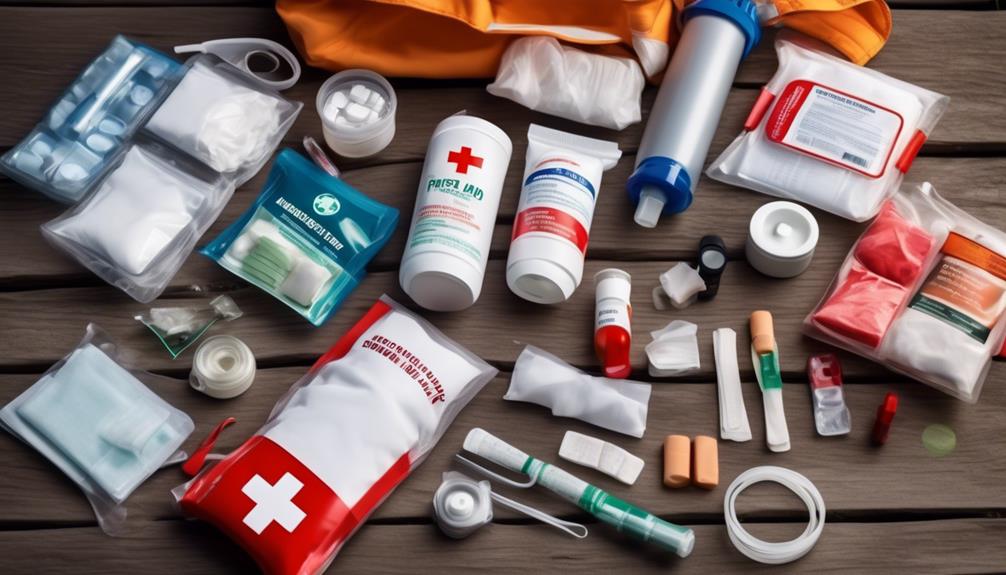
After establishing your shelter and securing your sleeping gear, it's important to prioritize safety and first aid preparations to ensure a worry-free camping experience.
First, make sure to pack a well-stocked first aid kit. Include essential items such as adhesive bandages, gauze, antiseptic wipes, tweezers, scissors, and any personal medications. Additionally, bring along a basic survival kit with items like a multi-tool, flashlight, matches, and a whistle.
When setting up your campsite, be mindful of potential hazards. Choose a safe location away from dead or unstable trees, and clear the area of any rocks, branches, or debris that could cause tripping or injury. Always keep a safe distance from wildlife and be mindful of your food storage to avoid attracting animals to your campsite.
Prioritize fire safety by checking for any fire restrictions in the area and familiarize yourself with proper fire building and extinguishing techniques. Always have a bucket of water or a fire extinguisher nearby when starting a campfire.
Lastly, familiarize yourself with basic first aid procedures. Knowing how to treat minor cuts, burns, sprains, and insect bites can make a significant difference in the event of an emergency. Additionally, it's essential to have a plan for contacting emergency services and to share your itinerary with someone responsible who can assist if needed.
Miscellaneous Items
When packing for your camping trip, consider including miscellaneous items that can enhance your overall camping experience, such as a deck of cards, a portable speaker, or a comfortable camping chair. These items may seem small, but they can make a big difference in your enjoyment of the great outdoors.
Here are a few miscellaneous items that can add comfort, entertainment, and convenience to your camping adventure:
- Comfort and Relaxation:
- A hammock: There's nothing quite like gently swaying in a hammock, surrounded by nature, to help you relax and unwind after a day of hiking and exploring. It's the perfect spot for an afternoon nap or some quiet reading time.
- Portable camping table: Having a small, foldable table can make meal times and game nights much more convenient. It provides a stable surface for food prep, dining, or playing games, adding a touch of comfort to your outdoor experience.
- Entertainment and Socializing:
- Campfire games: Pack a few classic campfire games like charades, truth or dare cards, or a frisbee to keep everyone entertained and bonding around the campfire. These simple activities can create lasting memories and foster a sense of camaraderie among your camping group.
- Star chart or stargazing app: Gazing at the stars can be a mesmerizing experience. Bring a star chart or download a stargazing app to identify constellations and learn about the night sky. It's a captivating and educational way to connect with the natural world around you.
These miscellaneous items can elevate your camping trip from enjoyable to truly memorable, providing moments of relaxation, fun, and connection with nature and fellow campers.
Frequently Asked Questions
What Are Some Tips for Finding the Best Campsites for First-Time Campers?
To find the best campsites for first-time campers, research online, read reviews, and consider location, amenities, and activities. Look for sites with easy access, level ground, and nearby water and restrooms.
How Can I Keep My Food and Belongings Safe From Wildlife While Camping?
To keep your food and belongings safe from wildlife while camping, store food in airtight containers, hang it from a tree, or use bear-proof canisters. Keep a clean campsite, properly dispose of trash, and never store food in your tent.
Are There Any Specific Camping Etiquette Rules I Should Be Aware of as a First-Time Camper?
When camping for the first time, it's essential to follow camping etiquette. Respect others' space, keep noise levels down, and leave no trace. Always follow campground rules, be mindful of wildlife, and be considerate of fellow campers.
What Are Some Important Considerations for Staying Safe During Extreme Weather While Camping?
When camping, always check the weather forecast and be prepared for extreme conditions. Pack appropriate clothing, a reliable tent, and emergency supplies. Stay updated on weather alerts and seek shelter if conditions worsen. Safety first!
How Can I Minimize My Impact on the Environment While Camping?
To minimize your impact on the environment while camping, follow Leave No Trace principles, pack out all trash, use biodegradable products, and stick to designated trails. Respect wildlife and avoid disturbing natural habitats to ensure minimal impact.
Conclusion
Now that you have your ultimate camping checklist for first-time campers, you're ready to embark on your outdoor adventure. Remember to double-check your gear before heading out, and don't forget to pack your sense of adventure and willingness to try new things.
With the right preparation and a positive attitude, you'll have an unforgettable camping experience. Happy camping!
